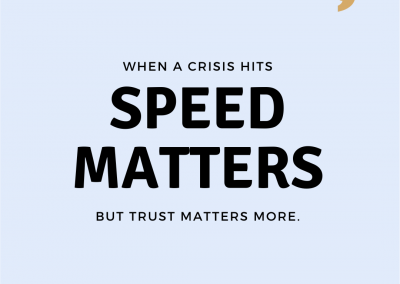Navigating crisis communication in the age of social media requires a strategic and proactive approach to effectively manage and mitigate the impact of crises on a company’s reputation. Here are some key steps and strategies to consider:
- Preparation and Planning:
- Develop a comprehensive crisis communication plan that outlines roles, responsibilities, communication channels, and strategies.
- Anticipate potential crises that could arise and create specific response plans for each scenario.
- Identify key spokespersons who will communicate on behalf of the company during a crisis.
- Monitor Social Media:
- Implement robust social media monitoring tools to track mentions, sentiment, and emerging issues related to your brand.
- Keep an eye on trending topics and discussions that could impact your company’s reputation.
- Swift Response:
- Respond quickly to emerging crises on social media to prevent misinformation from spreading and to show that the company is proactive.
- Acknowledge the issue, express empathy, and assure stakeholders that the situation is being addressed.
- Transparency and Authenticity:
- Be honest and transparent about the situation. Attempting to hide or downplay the crisis can lead to further damage to the company’s reputation.
- Use authentic language and avoid corporate jargon to connect with your audience on a human level.
- Centralized Communication:
- Ensure that all communications are consistent across various channels to avoid confusion and mixed messaging.
- Designate a central spokesperson or communication team to manage all external messaging.
- Engage with Stakeholders:
- Actively engage with stakeholders, including customers, employees, partners, and the public, to address their concerns and provide updates.
- Respond to comments and questions on social media in a timely manner.
- Adapt Your Strategy:
- Tailor your crisis communication approach based on the nature of the crisis. For instance, a product recall will require a different strategy than responding to a PR scandal.
- Monitor the effectiveness of your messaging and adjust your strategy as needed.
- Use Visual Content Wisely:
- Visual content can spread quickly on social media. Utilize images, videos, and infographics to convey important information effectively.
- Apologize and Make Amends:
- If the crisis resulted from a mistake on the company’s part, issue a sincere apology and outline the steps taken to rectify the situation.
- Learn and Improve:
- After managing the crisis, conduct a thorough review to understand what went wrong and what went right in your response.
- Use these insights to update your crisis communication plan and improve your strategies for the future.
- Prepare for Repercussions:
- Understand that some crises may have lasting effects, and recovery may take time. Be prepared for ongoing communication efforts.
- Employee Training:
- Train employees on how to respond appropriately on social media during a crisis, and make sure they are aware of the company’s communication protocols.
Remember, the key to successful crisis communication in the age of social media is to be proactive, transparent, and empathetic. Companies that effectively manage crises can often emerge with their reputations intact or even strengthened.





0 Comments